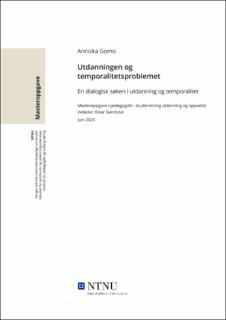| dc.contributor.advisor | Sundsdal, Einar. | |
| dc.contributor.author | Gomo, Annicka. | |
| dc.date.accessioned | 2021-09-28T17:39:05Z | |
| dc.date.available | 2021-09-28T17:39:05Z | |
| dc.date.issued | 2020 | |
| dc.identifier | no.ntnu:inspera:55104421:23318343 | |
| dc.identifier.uri | https://hdl.handle.net/11250/2784693 | |
| dc.description.abstract | Formålet med denne undersøkelsen er å forstå hvordan utdanning og temporalitet kan tenkes i sammenheng med hverandre. Denne masteroppgaven er derfor en hermeneutisk undersøkelse knyttet til utdanning og dens forhold til temporalitet – til fortid, nåtid og fremtid. Gjennom en dialog med og lesning av ulike filosofiske og pedagogiske teorier kommer det til syne at de teorier som her er lest er knyttet til temporalitet, enten eksplisitt eller mer implisitt. Hegels begrep om danning og utdanning viser seg begge å være bundet til fortiden. Hannah Arendt åpner for å lese Hegels dannelsesbegrep som bundet i en to-verden-struktur, og med Arendts begrep natalitet gis det pedagogiske nået innhold. Det pedagogiske nået hos Arendt viser seg likevel å ha en tilknytning til fremtiden, som da er knyttet til Arendts ontologiske perspektiv. John Dewey lar alle temporaliteter spille med i utdanningstenkningen, men med Arendt som deltakende i dialogen øker kompleksiteten ved både Deweys og Arendts forhold til temporalitet i utdanningstenkningen. Den nyliberale utdanningen er uttalt fremtidsrettet, og viser seg å gjennom sin fremtidsdisiplinering hverken å være en trygg sfære for barns vekst eller å være i stand til å holde sitt løfte henimot fremtiden. Med Gert Biesta og Carl. A. Säfström åpnes nye perspektiver knyttet til det temporale, og i møte med Jacques Derrida utvikles dette videre – hvor alt det foregående og det som er forstås på en ny og paradoksal måte. | |
| dc.description.abstract | The purpose of this study is to understand how education and temporality can be comprehended in relation to each other. This master thesis is therefore a hermeneutic study related to education and its relation to temporality – to the past, the present and the future. Through a dialogue with and reading of various philosophical and pedagogical theories it gets apparent that the educational thinking is linked to temporality, either explicitly or more implicitly. Hegel´s concept of Bildung and education both proves to be bound to the past. Hannah Arendt opens for a reading of Hegel´s educational concept as bound in a two-world structure, and with Arendt´s concept of natality the educational present is given content. Arendt´s educational thinking nevertheless appears to have a connection to the future which is related to Arendt´s ontological perspective. John Dewey takes all temporalities in to consideration in his educational philosophy, but with Arendt as a participant in the dialogue the complexity of both Dewey´s and Arendt´s connection to temporality in their educational thinking increases. The neoliberal education is explicitly tied to the future, and it turns out that it through its connection to the future neither is a safe sphere for children’s growth nor to be able to keep its promise regarding the future. With Gert Biesta and Carl A. Säfström new perspectives on the temporal opens up, and by including Jacques Derrida in the dialogue the previous notions of temporality are comprehended in a new and paradoxical way. | |
| dc.language | | |
| dc.publisher | NTNU | |
| dc.title | Utdanningen og temporalitetsproblemet | |
| dc.type | Master thesis | |
